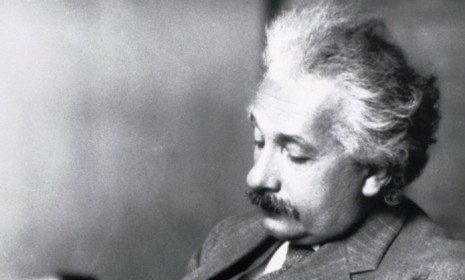The 4 biggest scientific breakthroughs of 2011
From neutrinos to new planets, a look at some of the year's most important discoveries

A free daily email with the biggest news stories of the day – and the best features from TheWeek.com
You are now subscribed
Your newsletter sign-up was successful
1. Upending the laws of physics
Researchers at the CERN laboratory in Geneva announced in September that they'd clocked subatomic particles called neutrinos moving faster than the speed of light. That finding directly contradicts Albert Einstein's 1905 special theory of relativity, which holds that nothing can outrun light. If neutrinos can, they could arrive at a destination before they even left, opening the prospect of time travel. Or could it be that neutrinos move through an undiscovered fifth dimension, separate from the three dimensions of space and one of time that we know about? Those ideas are so shocking that even the CERN team "wanted to find a mistake" in their data, says team leader Antonio Ereditato. But they didn't. And so far, further testing has failed to dismiss the finding, says theoretical physicist Matthew Strassler, as "a doorway into something fundamental and deep we don't know about nature."
2. Reasons to listen to your gut
The Week
Escape your echo chamber. Get the facts behind the news, plus analysis from multiple perspectives.

Sign up for The Week's Free Newsletters
From our morning news briefing to a weekly Good News Newsletter, get the best of The Week delivered directly to your inbox.
From our morning news briefing to a weekly Good News Newsletter, get the best of The Week delivered directly to your inbox.
Bacteria in our intestines may play a major role in the health of our minds and bodies. German researchers have discovered that just as each human being has a specific blood type, each of us also has one of three separate families of bacteria residing in our guts. A person's "enterotype" likely establishes itself in infancy and appears to affect everything from how well food is digested to how drugs are absorbed. The discovery of the three distinct gut ecosystems "was a surprise, and it's good news," says researcher Peer Bork. The finding could help physicians diagnose and treat serious digestive disorders, and also help explain why the effects of medicines and nutrients vary widely from person to person. Further studies have shown that ingesting a bacteria species found in certain yogurts and cheeses calms stressed-out mice — pointing to the prospect of treating psychiatric disorders with microbes instead of drugs.
3. Closing in on alien life
A galaxy-wide search for Earth-like planets has returned a startling number of candidates. Using NASA's Kepler space telescope, astronomers this year announced they'd spotted 2,326 new worlds and counting. Ten of those planets are close in size to our own and orbit their suns in the "habitable zone," where temperatures could be balmy enough to support liquid water — and potentially life. The best contender yet, Kepler-22b, looks to be a hospitable 72 degrees and circles a star very similar to our sun. The data pouring in from the spacecraft, launched in March 2009, are "game-changing," says Kepler principal investigator William Borucki. "It's just a tremendous amount of new knowledge." Already, other researchers are scanning the most promising Kepler finds for signs of alien life.
4. A new weapon against aging
A free daily email with the biggest news stories of the day – and the best features from TheWeek.com
The fountain of youth might one day flow within our own cells. Scientists working with mice have discovered that if they remove a special kind of cell that promotes aging, a host of age-related conditions disappear: The genetically modified rodents didn't develop cataracts, their skin didn't wrinkle, and they maintained high levels of energy throughout their lives. The so-called senescent cells have lost the ability to divide, and as they build up in aging tissue, they release toxins that destroy robust neighboring cells. Scientists devised a way of killing off those senescent cells, and the procedure "suggests therapies that might work in real patients," says Norman E. Sharpless, an expert on aging. If purging the cells works in people as it does in mice, the treatment could ward off a host of age-related diseases, from cancer to dementia, and keep us vigorous longer.